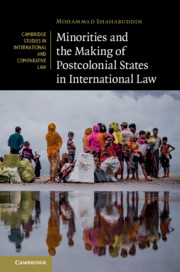Book contents
- Minorities and the Making of Postcolonial States in International Law
- Cambridge Studies in International and Comparative Law: 154
- Minorities and the Making of Postcolonial States in International Law
- Copyright page
- Dedication
- Contents
- Foreword
- Acknowledgements
- Table of Cases
- Abbreviations
- Introduction
- Part I Ethno-nationalism and the Ideology of the Postcolonial State
- Part II International Law and the Postcolonial State
- 3 The Postcolonial ‘National’ State:
- 4 The Postcolonial ‘Liberal’ State
- 5 The Postcolonial ‘Developmental’ State
- Conclusion
- Bibliography
- Index
- Cambridge Studies in International and Comparative Law
3 - The Postcolonial ‘National’ State:
Boundaries and International Law
from Part II - International Law and the Postcolonial State
Published online by Cambridge University Press: 21 May 2021
- Minorities and the Making of Postcolonial States in International Law
- Cambridge Studies in International and Comparative Law: 154
- Minorities and the Making of Postcolonial States in International Law
- Copyright page
- Dedication
- Contents
- Foreword
- Acknowledgements
- Table of Cases
- Abbreviations
- Introduction
- Part I Ethno-nationalism and the Ideology of the Postcolonial State
- Part II International Law and the Postcolonial State
- 3 The Postcolonial ‘National’ State:
- 4 The Postcolonial ‘Liberal’ State
- 5 The Postcolonial ‘Developmental’ State
- Conclusion
- Bibliography
- Index
- Cambridge Studies in International and Comparative Law
Summary
Chapter three deals with the role of international law in the ideology of the postcolonial ‘national’ state. With its ambition of achieving a homogeneous and unified sovereign entity, the postcolonial state essentially relies on international law principles for the continuity of colonial boundaries (uti possidetis), territorial integrity, sovereign equality, and non-interference in internal affairs. Contrary to the conventional wisdom that the uti possidetis principle helps in the maintenance of peace and order, I argue that uti possidetis is a key problem. Far from being a corrective mechanism halting potential ‘disorder’ emanating from decolonisation, the continuation of arbitrarily drawn colonial boundaries undermines the legitimate right to self-determination of numerous ethnic minorities in postcolonial states and often results in violent ethnic conflicts. The argument for uti possidetis in international law is also normatively inconsistent as it depends upon the capacity of the postcolonial state to efface ethno-nationalism while simultaneously allowing the state to produce its own sustaining nationalist ideology in majoritarian terms. The minority problem is thus embedded in the very ideological making of the postcolonial ‘national’ state in international law. My arguments in this chapter are substantiated with in-depth case studies on the Rohingya and the CHT hill people.
Keywords
- Type
- Chapter
- Information
- Publisher: Cambridge University PressPrint publication year: 2021



